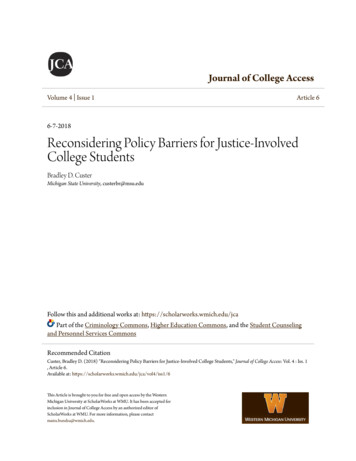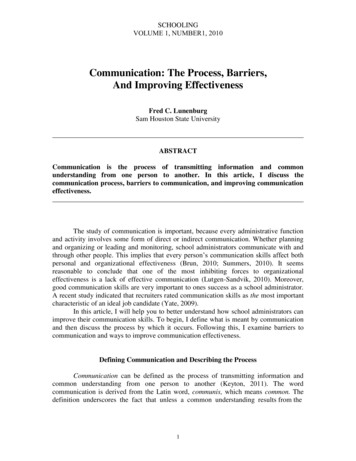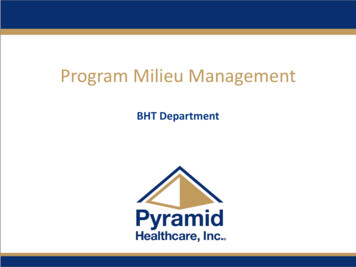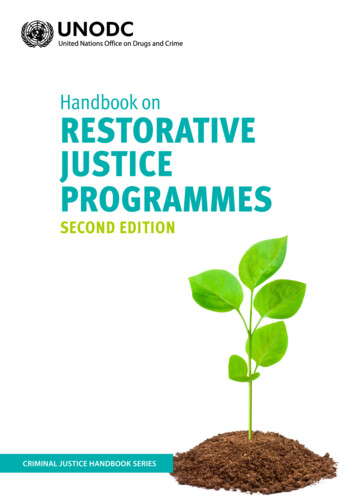
Transcription
Journal of College AccessVolume 4 Issue 1Article 66-7-2018Reconsidering Policy Barriers for Justice-InvolvedCollege StudentsBradley D. CusterMichigan State University, custerbr@msu.eduFollow this and additional works at: https://scholarworks.wmich.edu/jcaPart of the Criminology Commons, Higher Education Commons, and the Student Counselingand Personnel Services CommonsRecommended CitationCuster, Bradley D. (2018) "Reconsidering Policy Barriers for Justice-Involved College Students," Journal of College Access: Vol. 4 : Iss. 1, Article 6.Available at: https://scholarworks.wmich.edu/jca/vol4/iss1/6This Article is brought to you for free and open access by the WesternMichigan University at ScholarWorks at WMU. It has been accepted forinclusion in Journal of College Access by an authorized editor ofScholarWorks at WMU. For more information, please contactmaira.bundza@wmich.edu.
Perspective:Reconsidering Policy Barriers forJustice-Involved College StudentsAuthored byBradley D. Custer (Ph.D. student in Higher, Adult & LifelongEduca on, Michigan State University)Each year in the United States, morethan 700,000 people are releasedfrom prisons and jails (Davis et al.,2013). Many of them may decide toattend college, but they are likely to faceunique challenges. A wide range of laws andinstitutional policies target college studentswho have previous involvement in thecriminal justice system (called “justiceinvolved students”). In this piece, the majorpolicy barriers faced by justice-involvedstudents are identified and argued that suchpolicies are harmful to students andincompatible with higher education’s goalsfor improving access and completion. Byhelping students to overcome barriers and byencouraging policy changes, schoolcounselors, admissions officers, academicadvisors, and student affairs professionals canplay an important role in helping justiceinvolved students to be successful in college.groups, and to maintain a trained workforcethat can compete in the global marketplace(Hauptman, 2012). Much effort has gone intofostering student retention through federaland state policies, such as financial aid,remedial education, transfer and creditportability, outcomes-based funding, grantfunded programs, and accountability systems(Kelly & Schneider, 2012), but justice-involvedcollege students are not recognized in theseefforts. Quite the opposite, my review ofpolicies finds that higher educationpolicymakers at the federal, state, andinstitutional levels appear intentional inbuilding barriers that hinder justice-involvedstudents’ abilities to complete college. Byunveiling these sometimes hidden or ignoredbarriers, the goal is to bring awareness to themulti-faceted challenges faced by apotentially growing population of collegestudents.Driven by private foundations, statepolicymakers, community college leaders,and the Obama Administration, collegesacross the country have embraced acompletion agenda, particularly forunderrepresented students (Kelly &Schneider, 2012). The goals of this agenda areto increase the number of graduates, to closeeducational attainment gaps between certainThe term “justice-involved student” comesfrom the U.S. Department of Education’s(2016a) Beyond the Box report. “Justiceinvolved”―meaning involved in the criminaljustice system―specifically avoids thestigmatizing labels commonly applied to thispopulation and is necessarily broad toencompass a range of experiences. Peoplewith a history of arrests, juvenile crimes,Volume 4 June 2018 Issue 151
Justice-Involved College Studentsprevious attempt to synthesize the vastassortment of higher education policiestargeted at people with criminal histories. It isrelevant now because it draws attention to apopulation of students that are notrepresented within the college completionagenda, at a time when the stories andexperiences of justice-involved studentsincreasingly appear in the media and inqualitative research (see Ayers, 2017; Custer,2013a; Hager, 2017; Halkovic & Greene, 2015).For education professionals who rarelyinteract with justice-involved collegestudents, this policy review may be surprisingand hopefully initiates new discussions.misdemeanors, or felony convictions can becalled justice-involved, as well as people whoare currently or formerly incarcerated.“Justice-involved” is used mainly to refer to aperson with prior felony convictions. Since noteveryone convicted of a felony has beenincarcerated, the term “justice-involved”should not be conflated with “formerlyincarcerated.”Policy Barriers in Higher EducationIt is estimated that 25% of Americans havesome type of criminal record, and especiallyfor the estimated 20 million Americans withfelony convictions, criminal records last forlife (Jacobs, 2015). The criminal recordattaches to a person permanently, and it is theinstrument that allows for countless forms oflegalized discrimination, called collateralconsequences, to persist long after a person isreleased from the criminal justice system,including the loss of employment,occupational licensure, housing, welfarebenefits, voting rights, parental rights,privacy, or the ability to serve in the military,participate on juries, or hold public office, toname a few (Jacobs, 2015; Love, Roberts, &Klingele, 2013).This review of policies relied on a broad rangeof sources. First, a search was conducted forresearch literature from the fields of highereducation, criminal justice, legal studies,sociology, public policy, and more. Findingfew studies on the topic, this search alsoconsidered non-scholarly sources, includinglaws, institutional policies, court cases,governmental reports, non-governmentalorganization reports, and news sources. Table1 displays six categories of policies withcorresponding policy examples, for which ahyperlink is provided. These examples are notmeant to be representative of all policieswithin the category; instead, they offerreaders the option to explore a sample ofpolicies in more depth.People with criminal records who becomecollege students also face a range of collateralconsequences that are specific to highereducation, called barriers here, that have beenpreviously undocumented or understudied.In this piece, an inventory of the majorbarriers faced by justice-involved students inU.S. higher education was conducted, whichis significant in that there has been noVolume 4 June 2018 Issue 1AdmissionsIn the past 15 years, colleges haveincreasingly added questions about criminalhistory on admissions applications such that52
Justice-Involved College Studentswithout evidence of cost effectiveness orimpact on campus safety.most colleges now consider criminal historyinformation in general admission decisions(Custer, 2016; Weissman et al., 2010).Questions typically focus on felonyconvictions, but some institutions cast a widenet, requiring the disclosure ofmisdemeanors, juvenile crimes, arrests, andpending cases (U.S. Department of Education,2016a). Researchers have found no evidenceto show these admissions policies improvecampus safety, as intended (see Custer, 2016),and several studies have found that justiceinvolved applicants are deterred fromcompleting applications due to the stigma ofdisclosing their criminal history, leading tohigh levels of application attrition (Custer,2013a; Rosenthal et al., 2015).The admission of registered sex offenders isscrutinized heavily by institutions and stategovernments. Some institutions automaticallydeny admission to some or all categories ofsex offenders (see Houston CommunityCollege and University of Florida in Table 1).According to one court case in Michigan,policies that deny admission to broadcategories of offenders may violate the dueprocess rights of students (Kowarski, 2010;“Lake Michigan College,” 2011). Because ofthe lawsuit, Lake Michigan College changedits blanket admission ban on all sex offendersand agreed to conduct individual reviews ofapplicants. Some state laws also addrequirements to the admission andregistration process of registered sexoffenders. In seven states, students who areregistered sex offenders must register directlywith campus police departments, which ismore than what federal law requires, and inNew Mexico, those students must also notifythe college registrar of their sex offenderstatus (Custer, 2017).Most institutions rely on applicants todisclose prior misconduct by answeringquestions on admission applications, butsome institutions go further by conductingcriminal background checks. For example,Columbus State Community College requiresstudents to order and pay for their ownbackground checks (see Table 1 on page 54).Since 2007, the University of North Carolinasystem, which includes 17 public universities,has conducted criminal background checks onall applicants whose applications contain"triggers" or "red flags," such as not answeringcertain questions, inconsistent answers,unexplained time periods since graduation, oraffirmative responses to the criminal historyquestions (see Table 1). As shown below,criminal background checks are increasinglyused in higher education, from admissions tostudent employment to campus housing,Volume 4 June 2018 Issue 1Advocacy organizations and the ObamaAdministration’s Department of Educationhave suggested that colleges considerdiscontinuing the collection of criminalhistory information in the college admissionprocess; the chief concern is the potentialracial discrimination that could occur fromthe disproportionate number of marginalizedpeople in the criminal justice system(Rosenthal et al., 2015; U.S. Department of53
Justice-Involved College StudentsTable 1Policy Barriers for Justice-Involved Students in Higher EducationPolicyPolicy Examples (with Hyperlinks)AdmissionsColumbus State Community College, Students with History of Felony Conviction(s) WebsiteUniversity of North Carolina, Regulations on Student Applicant Background Checks PolicyState University of New York, Admission of Persons with Prior Felony Convictions PolicyHouston Community College, Convicted Sex Offender PolicyUniversity of Florida, Admission Reviews WebsiteFinancialAidCampusHousingFlorida Bright Futures Scholarship HandbookGeorgia HOPE Scholarship WebsiteBlinn College, Criminal History Record Check Requirement PolicyWeatherford College, Background Check Requirements PolicyWichita State University, Housing ContractStudentUniversity of Delaware, Human Resources Criminal Background Checks PolicyEmploymentAthleticsIdaho State Board of Education, Student Athletes PolicyCalifornia State University-Fresno, Athletics Recruitment PolicyAdditionalBarriersEastern Kentucky University, Registered Sex Offender ListingSeattle Central College, Registered Sex Offender ListingMoraine Valley Community College, Sex Offender PolicyVolume 4 June 2018 Issue 154
Justice-Involved College Studentspeople convicted of certain drug crimesineligible for federal student financial aidstarting in 2001 (Crawford, 2005). A personconvicted of a drug crime involvingpossession was ineligible for one year for thefirst offense, two years for the second offense,and indefinitely for the third. A drug salesconviction rendered a person ineligible fortwo years for the first offense and indefinitelyfor the second. After the one- or two-yearsuspension, individuals could resumeeligibility by completing a drug rehabilitationprogram (Higher Education Act, 1965).Between 2001 and 2004, it was estimated thatbetween 17,000 and 41,000 students losteligibility for financial aid due to a drugconviction (U.S. Government AccountabilityOffice, 2005). As a result, one study foundyouth with drug offenses delayed attendingcollege for about two years after high school,yet the policy did not deter youth fromcommitting drug crimes, as intended(Lovenheim & Owens, 2014).Education, 2016a; Weissman et al., 2010). As aresult, a few higher education institutionshave recently restricted the use of criminalhistory in admissions, including the StateUniversity of New York system (Rosenberg,2016) and the University of Minnesota(Clarey, 2016), and in 2017, Louisiana becamethe first state to partially ban the practice at itspublic institutions (Roll, 2017). The TrumpAdministration has not, as of early 2018,issued any statements on this policy topic.Financial AidWith mixed results, financial aid has overallbeen shown to have positive effects onenrollment, retention, and completion(Bettinger, 2012). For justice-involvedstudents, affording college without financialaid may be an insurmountable barrier toattending college, and students convicted ofdrug offenses, especially, face significantbarriers in getting financial aid.First, the Anti-Drug Abuse Act’s (1988) Denialof Federal Benefits Program allows federaland state judges to deny all types of federalaid to people convicted of drug trafficking orpossession charges (U.S. Department ofJustice, n.d.), which is documented in aninternal federal file against which all financialaid applicants are checked (U.S. Departmentof Education, 2015). No research hasdocumented how many people have beendenied federal financial aid under this law.In 2005, Congress amended the eligibility ruleby rendering only students convicted ofcertain drug crimes while receiving federalfinancial aid to be ineligible for aid, followingthe same schedule of penalties outlined above(Deficit Reduction Act, 2005). Currently,therefore, individuals with drug convictionsprior to receiving federal aid are not affected,but students who are on federal financial aidat the time they are convicted of drug crimescannot receive additional aid until regainingeligibility (Higher Education Act, 1965).Then in 1998, Congress passed the Drug-FreeStudent Loan Provision to amend the HigherEducation Act (1965), which rendered allVolume 4 June 2018 Issue 155
Justice-Involved College Students1; Downing, 2013). But then, Texas went astep further in 2017 to ban most sex offendersfrom campus housing at public and privateinstitutions (Raney, 2017). Even in stateswithout such laws, many institutions conductbackground checks on housing applicants andprohibit those with criminal histories fromliving in residence halls (see Wichita StateUniversity in Table 1).Finally, state financial aid policies also containeligibility barriers. Merit-based state financialis often unavailable to justice-involvedstudents. For example, students with anyfelony conviction are ineligible for Florida'sBright Futures Scholarship, and students witha drug felony conviction are ineligible forGeorgia’s HOPE awards for one termfollowing the conviction (see Table 1).Additional research is needed to quantifyexactly how many states deny financial aid tojustice-involved students.Balancing the legitimate safety and securityneeds of residence halls with the housingneeds of justice-involved students is acomplex policy problem for higher educationadministrators. More research is needed todocument trends in housing backgroundcheck policies and to develop evidence-basedcriteria for determining who should andshould not be permitted to live in residencehalls.Campus HousingThe scarcity of housing is one of the manycrises facing people released from prison.People with criminal histories, especially drugand sex offenders, are routinely denied accessto public and private housing (Love, Roberts,& Klingele, 2013), and many are forced to livewith family, friends, or become homeless(Petersilia, 2005; Roman & Travis, 2004).Despite evidence suggesting living oncampus improves student retention (Schudde,2011), justice-involved students commonlyface discrimination in on-campus housing.Some state statutes and state system policiesprohibit certain people from living in campushousing, including sex offenders in Texas,South Carolina, South Dakota, and Tennessee,as well as drug offenders in South Dakota.After Texas passed a law in 2013 allowingcolleges to access state criminal recordsdatabases for checking housing applicants,most Texas institutions implemented criminalbackground check policies and deniedhousing to most students with convictions(see Blinn and Weatherford Colleges in TableVolume 4 June 2018 Issue 1Student EmploymentDespite employment being one of the mostcritical factors for successful reentry,thousands of U.S. laws bar people withcriminal histories from working in certainpublic and private sectors (Harris & Keller,2005; Jacobs, 2015). Employers may alsochoose not to hire people with criminalconvictions, which is a legally permissiblepractice known as discretionary employmentdiscrimination (Jacobs, 2015). As theavailability of public electronic criminalrecords has increased, more employers areusing criminal background checking to barjustice-involved people from jobs (Jacobs,2015; Love, Roberts, & Klingele, 2013). Highereducation institutions are also increasingly56
Justice-Involved College Studentseligibility policies (see California StateUniversity-Fresno in Table 1; Hughes et al.,2015; Potrafke, 2006). In a recent survey of 567athletics directors, few reported conductingcriminal background checks on studentathletes: 12 (2.09%) conducted checks on allathletes, 7 (1.22%) conducted checks ontransfers only, 46 (8.01%) did not conductchecks but plan to start, while the remaining506 (88.68%) did not conduct checks and hadno plans to start (Hughes et al., 2015). Whilethe National Collegiate Athletic Association(NCAA) has no eligibility requirementsrelated to the prior criminal history ofathletes, commentators have called on theNCAA to implement background checkingpolicies, especially following stories ofathletes with known criminal historiestransferring to play at other institutions (New,2014; Potrafke, 2006).requiring employees to undergo criminalbackground checks, including studentemployees (Owen, 2014). A survey of 132institutions found 26% required criminalbackground checks for student employees,87% for staff, and 40% for faculty (Hughes,Hertz, & White, 2013). For example, theUniversity of Delaware conducts criminalbackground checks on all new employees,including undergraduate and graduatestudent workers (see Table 1). However, in astudy of crime data from four states, therewere no significant differences in campuscrime rates before and after mandatorybackground checks were implemented fornewly hired employees, regardless of therobustness of the background checkingpolicies (Hughes, Elliot, & Myers, 2014). It isestimated that 80% of all undergraduatestudents hold a job while attending college(Riggert, Boyle, Petrosko, Ash, & RudeParkins, 2006), and for justice-involvedstudents who need work, studentemployment may be the only viable option. Ifthere is doubt in the effectiveness of studentemployee background checks, eliminatingbackground checks could provide importantemployment opportunities for these students.Additional BarriersWhile the five categories of policies describedabove may constitute the most significantbarriers in higher education, there arecertainly others that require moreinvestigation. For example, students havecommented on not being able to participate instudent organizations or activities due tostigmatization from their criminal histories(Tewksbury, 2013), but some institutions mayrestrict justice-involved students fromparticipating in certain student activities.Justice-involved students are also likely toface difficulty studying abroad, participatingin service-learning projects, and otheractivities that involve communityengagement, work with children, traveling, orStudent AthletesStudent athletes face a unique class of rulesrelated to criminal history. For example, thestate of Idaho requires all public institutionsto collect and maintain criminal historyinformation on student athletes and prohibitsthem from recruiting athletes with felonyconvictions (see Table 1). Institutions in otherstates maintain similar recruiting andVolume 4 June 2018 Issue 157
Justice-Involved College StudentsHow to Support Justice-Involved StudentsTaken together, the policies described abovepresent a formidable challenge for justiceinvolved college students. At each stage oftheir college journey, these students facesystematic barriers from gaining admission,to qualifying for financial aid, finding a roomon campus, getting a job, playing sports, andbeyond. Though policymakers and campusadministrators argue these policies arenecessary for campus safety reasons, thelimited available policy research does notsupport such claims (Custer, 2016; Hughes,Elliot, & Myers, 2014). Therefore, educationprofessionals should be critical of thesepolicies’ unintended negative consequenceson student success. Next, an explanation ofhow the policies are harmful to students, andthen recommendations are offered toeducation professionals on supporting justiceinvolved students.visiting places like schools, hospitals, orprisons. In addition, there is no availableinformation on how international studentswith criminal convictions from their homecountries fare in gaining legal status to studyin the US, getting through the admissionsprocess, or overcoming the other barriersdescribed above. Additional research isneeded to explore policies affecting justiceinvolved students in these areas of collegestudent life.Students previously convicted of sex offensesare vulnerable targets for special policies. Inaddition to the barriers to admission andregistration mentioned above, hundreds ofinstitutions maintain their own sex offenderregistry websites where the names, andsometimes photographs, of sex offenderstudents are posted for campus communitymembers to see (see Eastern KentuckyUniversity and Seattle Central College inTable 1; Tewksbury, 2013; Tewksbury & Lees,2006). Institutions have also created policieswhereby sex offender students are subjectedto regular surveillance by campusadministrators (see Moraine ValleyCommunity College in Table 1). Furthermore,at the state level, 31 states post where aregistered sex offender is enrolled on sexoffender registry websites, and nine statesallow users to filter results by school name oraddress to view all registrants enrolled at aninstitution (Custer, 2017). These policiesdrastically increase the public exposure ofthese college students.Volume 4 June 2018 Issue 1Finding AlternativesMany of the policies described above areinsurmountable by design, like total bans onsex offenders in campus housing orineligibility for financial aid. To state theobvious, these policies are quite literallybarriers to student success because justiceinvolved students are prohibited frombenefiting from campus programs andservices that are designed to supportstudents. It should be no surprise, forexample, that a student who is ineligible forstate financial aid, who is not permitted tolive in campus housing, and who cannot gethired as a student employee has the deckstacked against him. Research is not needed58
Justice-Involved College Studentswell-positioned to help students overcome thebarriers.to conclude that many students are deniedsupport because of these policies, but futureresearch is needed to estimate how manystudents are affected by these policies and theextent to which justice-involved students canbe successful without the programs they aredenied.Preventing StigmaFor students who are not entirely blocked bypolicies, the literature offers anotherexplanation of how these policies can beharmful. Research suggests that stigma is atangible consequence for some justiceinvolved students dealing with these policies.Stigma is often described as a characteristic,mark, or label that designates a person as“flawed, compromised, and somehow lessthan fully human” (Dovidio, Major, &Crocker, 2000, p. 3), and in this case, thecriminal record is the stigmatizingcharacteristic. In a study of college applicantsin the State University of New York system, itwas estimated that two out of every threeapplicants with prior felony convictions whostarted an admission application did notcomplete it, potentially to avoid thestigmatizing admission process that ensued(Rosenthal et al., 2015). In a case study of oneuniversity applicant who withdrew heradmission application, it was clear that stigmaplayed a role in her decision to drop out(Custer, 2013a). In a qualitative study ofadmissions essays required of applicants withcriminal history, applicants reported feelingjudged, fear of losing education opportunities,anger about having to relive and describe pastcrimes, embarrassment, and lowered selfesteem because of the application process(Custer, 2013b). From these cases, it appearsthat the admission process is a powerfulsource of stigma that deters prospectivecollege students.The task for education professionals, then, isto help students find alternatives to theservices and programs that they are denied.When prospective students seek admission,school counselors and admissions officersshould be aware of which institutions in theircommunity or state require the disclosure ofcriminal history; then, they should beprepared to explain the often-unpublishedcriminal history review process, includingadvice on how to succeed in gainingadmission (see Custer, 2016). When studentscannot get hired on campus, career servicesprofessionals should be knowledgeable aboutemployers in the community who hire peoplewith criminal history (e.g., employers whotake advantage of tax credits or federalbonding for hiring people with criminalhistory; see Rakis, 2005). When students areblocked from living on campus, housingprofessionals should be aware of thebackground checking practices of localhousing communities and should referstudents to properties that are open to peoplewith criminal histories. When students aredenied financial aid, financial aid officersshould be able to recommend alternatescholarship programs and funding sources. Ifknowledgeable about the policies and theiralternatives, education professionals can beVolume 4 June 2018 Issue 159
Justice-Involved College StudentsThere has been such little research on theexperiences of justice-involved collegestudents that these accounts stand out astroublesome. Stigma appears to be a commonexperience, and the policies identified above–especially admissions–are regularly cited bystudents as sources of stigma. It is thecontinual unveiling of a student’s criminalhistory at different points in the collegejourney that harms these students, makingthem feel exposed and vulnerable. Forcampus administrators, conducting aninventory of all the points at which a studentmust disclose criminal history would beinformative. From there, reducing the numberof disclosure points could go a long way insupporting justice-involved students byprotecting their privacy, dignity, and basicright to learn in a judgement-freeenvironment.Many justice-involved students make itthrough the admission process or attendcolleges that do not inquire about criminalhistory. Once enrolled, they facestigmatization from peers, faculty, andadministrators each time they are identified ashaving a criminal record, like when applyingfor campus jobs or financial aid. In perhapsthe first study of justice-involved collegestudents, Copenhaver, Edwards-Willey, andByers (2007) explicitly studied how fourstudents experienced and coped with stigma.The participants reported fear of beingidentified and described the difficulty ofconcealing their prison tattoos and decidingwhen and when not to disclose their historyfor fear of judgment (Copenhaver, EdwardsWilley, & Byers 2007). Similar experienceshave been reported in subsequent studies(Halkovic & Greene, 2015). Two formerlyincarcerated, African-American male studentsreported being stigmatized by pejorativelabels, including ex-offender, convict, andcriminal, “which negatively affected somepeer interactions, limited options for campusinvolvement, and all-too-often shaped facultymembers’ perceptions of the students(Strayhorn, Johnson, & Barrett, 2013, p. 84).The students were victims of stereotyping,racial micro-aggressions, and loweredexpectations from faculty, staff, and peers(Strayhorn, Johnson, & Barrett, 2013). Inaddition, at institutions that maintain campus-based sex offender registries, students whoare registered sex offenders have reportedintense social isolation and vulnerability,particularly related to the fear of beingidentified by others (Tewksbury, 2013).Volume 4 June 2018 Issue 1To protect justice-involved students fromstigmatization, policy changes are necessary.Admissions officers should consider delayingor eliminating the collection of criminalhistory information, as some institutions haverecently done (Clarey, 2016; Rosenberg, 2016).Campus police departments should removecampus-based sex offender listings from theirwebsites, leaving only the links to state sexoffender registries, as required by federal law(U.S. Department of Education, 2016b).Campus housing professionals should stopconducting criminal background checks on allstudents, except when required by state law.Similarly, human resources departmentsshould stop conducting background checkson all student employees, except for those60
Justice-Involved College StudentsReferenceswho apply to sensitive positions. In most ofthese cases, campus administratorsestablished the policy barriers for justiceinvolved students, which means they areequally empowered to change or eliminatethem. Making these policy changes wouldconstitute significant advances in the supportof justice-involved students.Ayers, E. (2017, March). Choosing educa on overincarcera on. Dig Mag. Retrieved fromwww.digmagonline.comBe nger, E. (2012). Financial aid: A blunt instrument forincreasing degree a ainment. In A. P. Kelly & M. Schneider(Eds.), Ge ng to gradua on: The comple on agenda inhigher educa on (pp. 157‐174). Bal more: Johns HopkinsUniversity Press.Clarey, D. (2016, December 5). University nixes felonyques on on student applica ons. Minnesota Daily.Retrieved from h p://www.mndaily.com/ConclusionThe purpose of this essay was to raisea
The term "justice-involved student" comes from the U.S. Department of Education's (2016a) Beyond the Box report. "Justice-involved"―meaning involved in the criminal justice system―specifically avoids the stigmatizing labels commonly applied to this population and is necessarily broad to encompass a range of experiences. People










